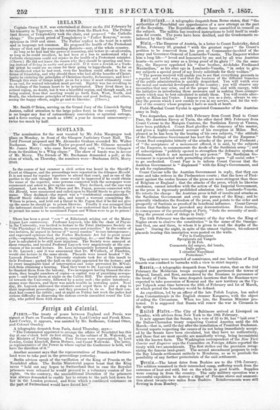SCOTLAND.
The nomination for the seat vacated by Mr. John Macgregor took place on Monday, in front of the Glasgow Justiciary Court Hall. The Lord Provost proposed and Mr. Alexander Graham seconded Mr. Walter Buchanan. Mr. Councillor Taylor proposed and Mr. Gilmour seconded Mr. James Merry ; who came forward, they said, "to rescue Glasgow from its thraldom to a Whig clique." The show of hands was in favour of Mr. Merry. The Mende of Mr. Buchanan demanded a poll ; at the close of which, on Thursday, the numbers were—Buchanan 5979, Merry 2943.
In the course of last summer a civil action was heard in the Sheriff's Court at Glasgow, and the proceedings were reported in the Glasgow Herald. It is not usual for regular reporters to attend that court, and as one of the parties to the suit thought his cause would be improved if he could obtain the name of the reporter, some persons connected with the newspaper were summoned.and asked to give up the name. They declined, and the case was "adjourned. Last week, Mr. Wilson and Mr. Pagan, persons connected with the Herald, were summoned and called,upon by Sheriff Steele to give up the -name. They declined—thereport was a "confidential communication." Sheriff Steele ridiculed this idea, and issued a warrant committing Mr. Wilson to prison, and held out a throat to Mr. Pagan that if he did not give tip the name he should go to prison likewise. Finally it was arranged that the informant should be consulted, and it was understood that if he declined to permit his name to be mentioned Pagan and Wilson were to go to prison !
. There has been a great " row " at Edinburgh arising out of the Maine Liquor Law controversy. Professor Laycock, who fills the chair of Physic in the University, was invited to lecture to the Total Abstinence Society on "the Physiology of Drunkenness, its causes and remedies." In the course of two lectures, he argued in favour of " moral suasion" to cure intemperance ; and expressed opinions that the Forbes Mackenzie Act led to great moral evils,—espionage, falsehood, perjury, smuggling, &e.,—and that the Maine Law is calculated to ho still more injurious. The Society were annoyed at these remarks, and treated Professor Laycock very ungraciously at the conclusion of his second lecture. Dr. Lees subsequently lectured in opposition to Dr. Larne& ; and it was announced that Dr. M'Culloch, of Dumfries, would also lecture in the same strain. Placards were issued headed "Dr. Laycock _Dissected." The University students took fire at this insult to their Professor ; packed the hall on the night appointed for the lecture ; and by every imaginable kind of interruption and noise prevented Dr. M'Culloch from obtaining a hearing. Then they went to Dr. Layeock's house, and he thanked them from the balcony. Two newspapers having blamed the students, they bought numbers of copies—a capital way of punishing newspapers I—and burnt then. at night on the Calton Hill. The students returned towards the University, followed by a noisy mob ; the police interfered ; stones were thrown, and there was much trouble in restoring quiet. Next slay, Dr. Layeock addressed the students and urged them to put a stop to their imprudent proceedings ; and they promised to do so. But their conduct had roused the rabble ; and at night on Friday last week the police had serious difficulty in dispersing the riotous crowds assembled round the Unififty, who pelted them with stones.


























 Previous page
Previous page